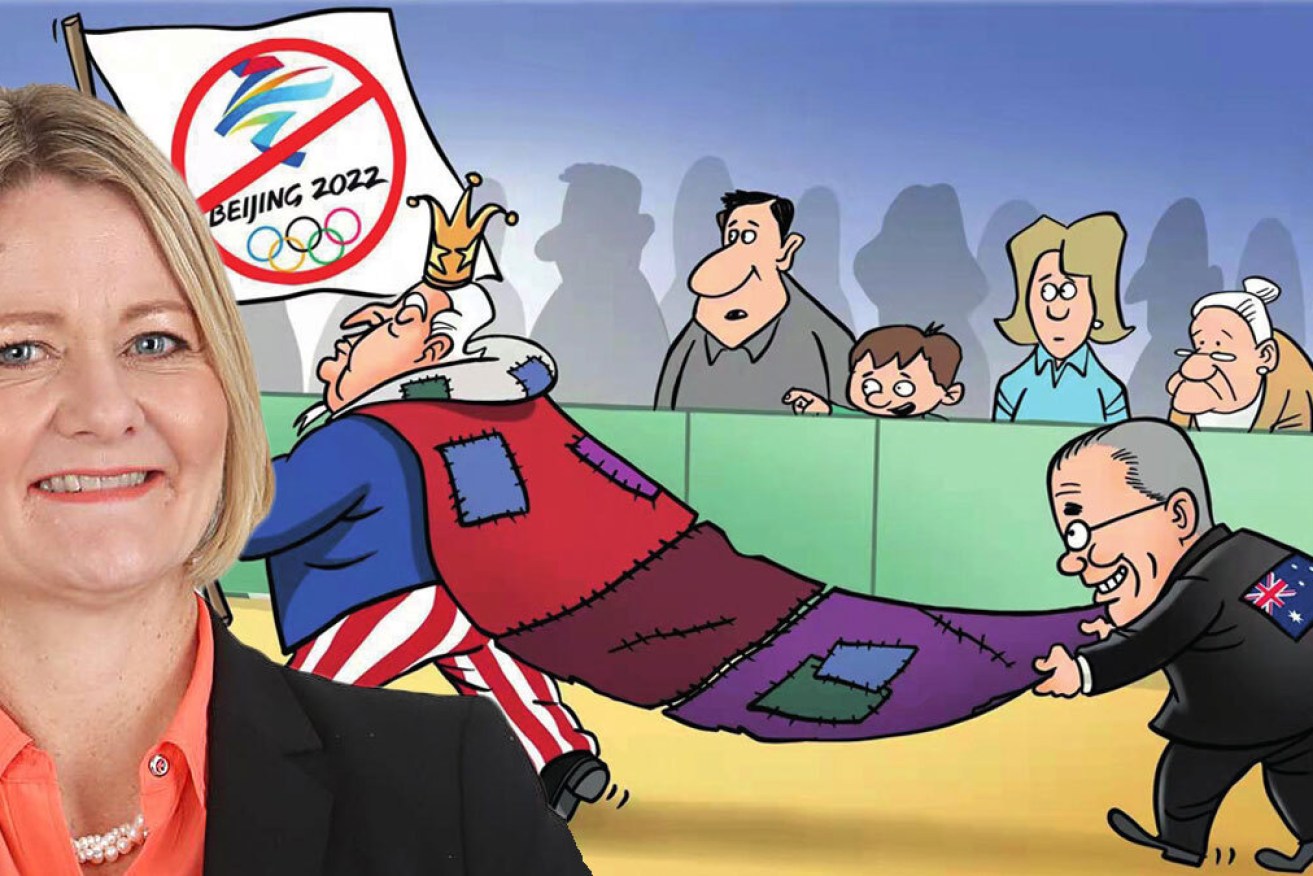Subtle actions could speak louder than a diplomatic boycott of China’s Winter Olympics


Will a diplomatic boycott make any difference in the long run? Is this a case where change starts somewhere small and we are seeing the beginnings of something much bigger, asks Cindy Wockner.
According to China, “nobody cares” whether Australian politicians and diplomats turn up at the Beijing Winter Olympics or stay home.
It’s all “political posturing”, on their reckoning.
But for a country which claims it couldn’t give a toss about Australia and a host of other nations staging a diplomatic boycott of its Winter Games, it is protesting pretty loudly.
And they are using their state-owned and controlled press to ram home the message, describing Australia as the “No 1 US lackey” and mocking us for blindly following the “big brother” US.
Why, if China doesn’t care, do they keep going on about it? Thou doth protest too much, perhaps.
The truth is that the decision of the US, the UK, Canada and Australia to diplomatically snub the upcoming Games, set for February 2022, in protest at China’s gross human rights abuses is hurting.
Otherwise, why keep going on and on about it, pushing the barrow with your media mouthpieces?
And then there was this threat from foreign ministry spokesman Wang Wenbin at a daily briefing: “The US, Australia, Britain and Canada’s use of the Olympic platform for political manipulation is unpopular and self-isolating and they will inevitably pay the price for their wrongdoing.”
One wonders what kind of threat this is. More trade sanctions against Australia perhaps, or just words.
Michael Shoebridge from the Australian Strategic Policy Institute says any more sanctions would risk hurting China more than Australia.
‘All about symbolism’
“If you don’t care, why do you keep shouting?” Shoebridge wonders. “This is all about symbolism and prestige. It matters deeply – and that’s why they are yelling about it.”
Shoebridge is the director of ASPI’s defence, strategy and national security program. He says that France’s decision not to join the boycott because, in their view, sport and politics shouldn’t be mixed, is missing the point.
He says the Chinese Communist Party is not hosting the Winter Games because they love sport. They love prestige, and the whole point was to get world leaders to Beijing so that President Xi Jinping could bask in all the attention.
Shoebridge says politics and sport are completely fused in the Chinese government’s eyes. Case in point – the treatment of tennis player Peng Shuai, silenced for alleging a former top official of the Communist Party sexually abused her.
“Even if I’m an egg throwing myself at a rock, even if I’m a moth flying at a flame, courting my own destruction, I will still speak the truth of us,” her words said.
So, is there a point to a diplomatic boycott? Or will it make little difference in the long run? Is this a case where change starts somewhere small and we are seeing the beginnings of something much bigger?
Human Rights Watch, which has long campaigned against China’s human rights abuses, has backed the diplomatic boycott. In a report in mid-2021, HRW said the Chinese government was committing crimes against humanity against Uyghurs and other Turkic Muslims in the region of Xinjiang. They said the Chinese leadership was responsible for widespread and systematic policies of mass detention, torture and cultural persecution.
Richard McGregor, senior research fellow for East Asia at the Lowy Institute, says in the immediate term it probably makes little difference and perhaps even hardens the position of both parties. And Chinese, whose lives are better than they have been, do not take lightly to Westerners telling them they are in a pariah nation.
McGregor says that as China becomes richer and more powerful, other nations have less influence.
It remains to be seen whether China decides, in the wake of the boycott, to slap more trade sanctions on Australia, similar to their response to Australia’s calls for an independent inquiry into the COVID-19 outbreak.
Back then, China announced an 80 per cent tariff on Australian barley and suspended beef imports from four Australian meatworks.
The athletes’ conundrum
Most interesting will be how the athletes themselves act in China and whether they will make their own protests and stand up for human rights. It’s a conundrum for athletes who must accept the International Olympic Committee’s decisions on where the Games are held and abide by IOC rules.
Athletes cannot protest at medal ceremonies or during events.
But, says Michael Shoebridge, they are free to speak at press conferences and on social media.
And he says some powerful symbolic imagery – like an egg on a press conference table, a hand over the athlete’s mouth – could have a bigger impact than a diplomatic boycott.
It is time for Winter Olympics athletes, around the world, to start thinking about their own principles when it comes to human rights and what stance they might take. Not everyone is privileged to live in a nation where human rights are sacrosanct. And not many of us are world-class athletes with a stage from which to take a stand.








